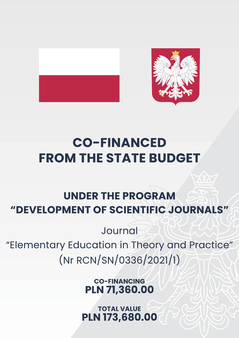The (Pre-)school Education of Six-year-olds (Reflections on the Reforms Introduced by the Polish Ministry of National Education)
Abstract
This paper presents its author’s opinions regarding the compulsory school education of six-year-olds introduced in Poland in 2008. Commenting critically on the decision made by the Ministry of National Education, the author emphasises, firstly, that academic research lends no support to it, and, secondly, that the decision was made without consulting either academic experts or children’s parents, so that it manifested a complete disregard for democratic norms on the part of both the politicians involved and those who planned the reforms. The author shows just how dysfunctional the reforms have proved to be by pointing to research which reveals that neither school institutions, nor teachers themselves, have been properly prepared for educating six-year-olds. Furthermore, reasons are given for why children aged six should be educated as part of the pre-school education system. The author emphasizes that preschool institutions guarantee these children social, emotional, material, and organisational conditions, such as cannot be offered by ordinary Polish schools at the present time. The campaign sponsored by the Ministry of National Education, aimed at encouraging parents to send their sixyear- olds to school, is, in the author’s opinion, actually a form of propaganda seeking to devalue the educational role of pre-school establishments. In order to illustrate her viewpoint, the author quotes selected fragments from texts published by the Ministry of National Education on its website. In conclusion, she calls attention both to the political character of the reform introduced, and to its devaluing of the importance of pre-school education. She also observes that in a democratic state, it should be for parents to decide whether their six-year-old children can already commence regular schooling or should continue with pre-school education instead.References
Dziecko sześcioletnie idzie do szkoły. Wybór tekstów, Instytut Badań Edukacyjnych, Warszawa 2012.
Dziecko w szkolnej rzeczywistości. Założony a rzeczywisty obraz edukacji elementarnej, (red.) H. Sowińska, Wydawnictwo Naukowe UAM, Poznań 2011.
Klus-Stańska D., Nowicka M., Gotowość szkół podstawowych do obniżenia wieku szkolnego. Przykład olsztyński, „Problemy Wczesnej Edukacji”, 2009, numer specjalny.
Sześciolatki w szkole. Działania samorządów – dobre praktyki. Ministerstwo Edukacji Narodowej. Ośrodek Rozwoju Edukacji, https://www.6-latki. men.gov.pl (dostęp: 22.08.2013).
Śliwerski B., Krytycznie o polityce oświatowej MEN negującego demokratyzację oświaty publicznej w III RP, „Problemy Wczesnej Edukacji”, 14(2011)2.
Śliwerski B., Nauczyciel edukacji wczesnoszkolnej między posłuszeństwem a oporem, [w:] (red.) M. Suświłło, Nauczyciel wczesnej edukacji – konteksty i wyzwania, Wydawnictwo Uniwersytetu Warmińsko-Mazurskiego, Olsztyn 2012.
https://www.6-latki.men.gov.pl (dostęp: 22.08.2013).
Copyright (c) 2016 Elementary Education in Theory and Practice

This work is licensed under a Creative Commons Attribution-NoDerivatives 4.0 International License.
- When submitting a text, the author declares that he/she is the Author of the article (hereinafter referred to as the “Work”) and:
- he/she owns the exclusive and unlimited copyright to the Work,
- is entitled to dispose of the copyright to the Work.
Declares that it does not infringe any third party copyrights or legal rights.
Declares that there is no conflict of interest.
2. At the same time, the Author grants the Ignatianum University in Cracowa royalty-free, non-exclusive and territorially unlimited licence to use the Work in the following fields of exploitation:
- recording the Work in a hard copy, as well as on a digital or magnetic medium;
- reproduction of the Work using any technique, without limitation of the number of editions or copies;
- distribution of the Work and its copies on any medium, including marketing, sale, lending, and rental;
- introduction of the Work into a computer memory;
- disseminating the Work in information networks, including in the Internet;
- public performance, exhibition, display, reproduction, broadcasting and re-broadcasting, as well as making the Work available to the public in such a way that everyone can have access to it at a time and place of their own choosing;
- within the scope of dependent rights to the Work, including in particular the right to make necessary changes to the Work resulting from editorial and methodical development, as well as to translate the Work into foreign languages;
The licence is granted from the moment of the transfer of the Work to the Ignatianum University in Cracow. The Ignatianum University in Cracow is entitled to grant further sub-licences to the Work within the scope of the right granted. The licence is time-limited and it is granted for a period of 15 years, starting from the date of its granting.
Authors are permitted and encouraged to publish their text online (e.g. in their institution’s repository or on the institution’s website) before or during the submission process as this may lead to beneficial exchanges, as well as earlier and greater citation of the published text (See The Effect of Open Access). We recommend using any of the following portals of research associations:
- ResearchGate
- SSRN
- Academia.edu
- Selected Works
- Academic Search





